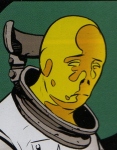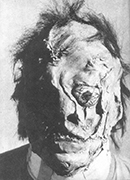- Hieronymous Alloy
- Jan 30, 2009
-

Why! Why!! Why must you refuse to accept that Dr. Hieronymous Alloy's Genetically Enhanced Cream Corn Is Superior to the Leading Brand on the Market!?!


-
Morbid Hound
|
We haven't done nonfiction in a while, so here are a few options. As always, you can vote for more than one, but please only vote if you plan on participating if a book you vote for is selected -- these polls are interest checks.
1) King Leopold's Ghost by Adam Hothschild
quote:
King Leopold's Ghost: A Story of Greed, Terror and Heroism in Colonial Africa (1998) is a best-selling popular history book by Adam Hochschild that explores the exploitation of the Congo Free State by King Leopold II of Belgium between 1885 and 1908, as well as the large-scale atrocities committed during that period.[1] The book succeeded in increasing public awareness of these Belgian colonial crimes.[2]
It was refused by nine of the 10 U.S. publishing houses to which an outline was submitted, but became an unexpected bestseller and won the prestigious Mark Lynton History Prize for literary style. It also won the 1999 Duff Cooper Prize. By 2013 more than 600,000 copies were in print in a dozen languages. quote:
Listen to the yell of Leopold's ghost,
Burning in Hell for his hand-maimed host.
Hear how the demons chuckle and yell,
Cutting his hands off, down in Hell.
2) A Year on the Killing Streets by David Simon
quote:
Homicide: A Year on the Killing Streets is a 1991 book written by Baltimore Sun reporter David Simon describing a year spent with detectives from the Baltimore Police Department Homicide Unit. The book received the 1992 Edgar Award in the Best Fact Crime category.[1]
The book was subsequently fictionalized as the NBC television drama Homicide: Life on the Street (1993–99), on which Simon served as a writer and producer. Many of the key detectives and incidents portrayed in the book provided inspiration for the first two seasons of the show, with other elements surfacing in later seasons as well. It later also provided inspiration for the HBO television series The Wire (2002–08).
3: Lectures on Literature by Nabokov
quote:
The published lectures are, apart from everything else, dutiful, even professorial. They are concrete, efficient, not the wanderings of an imported star who takes off early by way of discussion periods. We are told by Andrew Field that Nabokov's scientific work on butterflies was "painstaking" and marked by a "scale by scale meticulousness." There is something of this also in the approach to the performance before as many as 400 students and the acceptance of certain ever-returning weekends with 150 examination papers to be read.
The young audience is there to hear him, even if he does not know what they may have brought with them. Nabokov stands aside in the beginning, perturbed, it may be imagined, not only by the rarity of literature, but by the rarity of reading, true reading. He solicits rather poignantly from the students the ineffable "tingling spine" and "shiver" of the esthetic response, all that cannot be written down in notebooks and which is as hopeless of definition as the act of composition itself.
. . .
Following these lectures with their determined clinging to detail, and with the insistent foot on each rung of the scaffolding of the plot, is to be asked to experience the novel itself in a kind of thoughtfully assisted re-reading, without interpretation. There is very little ripe, plump, appreciative language. "Beautiful" turns are acknowledged by "note" and "mark." In "Madame Bovary" "note the long fine sunrays through the chinks in the closed shutters" and "mark the insidious daylight that made velvet of the soot at the back of the fireplace and touched with livid blue the cold cinders." A novel is a rare object. Look at it with a magnifying glass and the earphones turned off. And curiously each work is alone, not milling about among its siblings, "Emma," "Our Mutual Friend," "Portrait of an Artist" and so on and so on.
. . .
Perhaps in the end it is not surprising that this writer who has walked every step of the way in two languages should look upon style as the self in all its being and the novel as a slow, patient construction of a gleaming fairy tale. "Let us look at the web and not the spider," he writes about Dickens. The web, the inimitable web, is what these lectures are about.
https://archive.nytimes.com/www.nytimes.com/books/98/07/26/specials/hardwick-nabokov.html?mcubz=3
4) Homage to Catalonia by George Orwell
quote:
Homage to Catalonia is George Orwell's personal account of his experiences and observations in the Spanish Civil War. The first edition was published in the United Kingdom in 1938. The book was not published in the United States until February 1952, when it appeared with an influential preface by Lionel Trilling. . . . .
Contemporary reviews of the book were mixed. Notably positive reviews came from Geoffrey Gorer in Time and Tide, and from Philip Mairet in the New English Weekly. Geoffrey Gorer concluded, "Politically and as literature it is a work of first-class importance." Philip Mairet observed, "It shows us the heart of innocence that lies in revolution; also the miasma of lying that, far more than the cruelty, takes the heart out of it." Hostile notices came from the Tablet, where a Catholic critic wondered why Orwell had not troubled to get to know Fascist fighters and enquire about their motivations, and from the Times Literary Supplement and The Listener, "the first misrepresenting what Orwell had said and the latter attacking the POUM, but never mentioning the book."[20] John Langdon-Davies wrote in the Communist Party's Daily Worker that "the value of the book is that it gives an honest picture of the sort of mentality that toys with revolutionary romanticism but shies violently at revolutionary discipline. It should be read as a warning."[21] Some Conservative and Catholic opponents of the Spanish Republic felt vindicated by Orwell's attack on the role of the Communists in Spain; The Spectator's review concluded that this "dismal record of intrigue, injustice, incompetence, quarrelling, lying communist propaganda, police spying, illegal imprisonment, filth and disorder," was evidence that the Republic deserved to fall.[22] A mixed review was supplied by V.S. Pritchett who called Orwell naïve about Spain but added that "no one excels him in bringing to the eyes, ears and nostrils the nasty ingredients of fevered situations; and I would recommend him warmly to all who are concerned about the realities of personal experience in a muddled cause."[23] Franz Borkenau, in a letter to Orwell of June 1938, called the book, together with his own The Spanish Cockpit, a complete "picture of the revolutionary phase of the Spanish War."
|
 #
?
Apr 26, 2018 16:18
#
?
Apr 26, 2018 16:18
|
|
- Adbot
-
ADBOT LOVES YOU
|

|
|
#
?
Apr 23, 2024 16:43
|
|
- OscarDiggs
- Jun 1, 2011
-

Those sure are words on pages which are given in a sequential order!
|
I was actually just assigned Lectures In Literature by the recommend a book thread, so it would be neat if that won this month.
|
 #
?
Apr 29, 2018 18:45
#
?
Apr 29, 2018 18:45
|
|
- Cloks
- Feb 1, 2013
-

by Azathoth
|
A year on the killing streets.
|
 #
?
May 1, 2018 14:08
#
?
May 1, 2018 14:08
|
|









